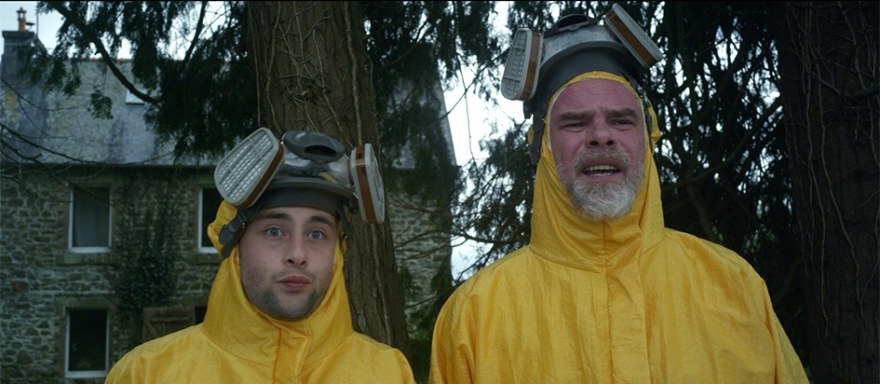Tea time with Rase Campagne
Interview with Pierre-Emmanuel Urcun, director of Rase campagne
How did you choose the shooting location?
The Monts d’Arrée are a very particular place known to everyone in Finistere. It’s a place that feels out of time. With its ochre colors and its ancient mountains with their distinctive rocks, it’s a place for hiking and escape. I have often gone roaming there. I had wanted to shoot there for quite some time. I was just waiting for the right opportunity. When I wrote Rase campagne, it became clear to me. And it was also a kind of joke, since the title talks about countryside which one often considers dull and flat. Here, the valleys of the Monts d’Arrée are anything but. I also wanted to put a Western touch into the aesthetic of the film and the ochre heath of the Monts d’Arrée and the diversity of its vast countryside fit perfectly.
Why did rural countryside interest you?
I grew up in the city, but I spent a good amount of time in the country with family and friends (from the area surrounding Brest) who were there to study and returned on weekends. It’s a place that is familiar to me, but I had lost contact with it. Because I missed the place, I wanted to return to it… in my own way.
How did you get the idea for placing this young character Rémi in the middle of this manhunt? Why was he important?
The character of Rémi – his name is Angel -, I met him one night and we had a beer. It was a lightbulb moment. Hard to know why. His way of being, his candidness, his slight lisp? I don’t know. I did not know when our paths would cross again, but it was meant to be. When the idea of Rase campagne came together, I immediately wanted to set up a meeting between Ludovic, an old travel companion, and Angel — in order to bring this duo to life. A mountain of a man and a fresh, innocent young guy… Rémi cannot exist without Michel and Michel cannot exist without Rémi. This duality and complementarity interested me. I love the notion of duos in films. They were made to meet, and in a way, I was but a go-between…
The character of Rémi, timid, young, and naive, is a witness who has not yet really defined his own conscience. He sees that something is not quite right, but he cannot identify what. Unable to understand, he follows and observes. Throughout the investigation, he begins to wonder and to have his doubts. By the end of the day, he has ultimately learned something about life. He embodies the new rural generation, as opposed to the old one, seen here in Ludovic.
In Rase campagne, you tackle questions of relationships between people and you put your characters in a little circle delineated by geographic proximity. Why did you want to “frame” a group of “local” people?
I wanted first and foremost to make a film about friendship. If you add the notion of them being by themselves, that made for the geometrical relationship that I wanted to establish between the characters. In a short film, we have little time to express the complexity of a character. So I wanted to spend time with Michel and Rémi and shape the other characters based on their contact with the duo. This way, their lives intermingle and mix together and little by little show the emotional landscape of the characters.
You question the notion of distance itself, relative distance, geographic distance… distance in time, too? What interests you in this theme?
Each film creates its own mythology, its own world, and finds an alchemy between its characters and its aesthetic. The narrative that works is about being able to find a distance that is right…
Any cinematic coups de cœur in the past year you’d like to tell us about?
Unfortunately, last year I did not go to the movies enough to have a real favorite… I hope to make up for it in 2017 and to choose good films…
If you’ve already been to Clermont-Ferrand, could you share with us an anecdote from the festival? If not, what are your expectations for this year?
We were fortunate enough to come two years ago with the actors of the film Le dernier des Céfrans for its first public screening (see interview). We had a wonderful week sharing the film with audiences in Clermont-Ferrand. Loads of stories. It was emotional since it was our first time showing the film. Getting the Canal+ Prize was the cherry on top… I have a great overall memory of last time here.
Will the film have other public screenings?
In April on Canal+, who is a partner of the film.
Are you taking part in any other events during the Clermont-Ferrand Short Film Festival (Espressos, conferences, other)?
Not as yet, we just finished the film, and Clermont-Ferrand will be its first screening.
Rase campagne is being shown in National Competition F4.








